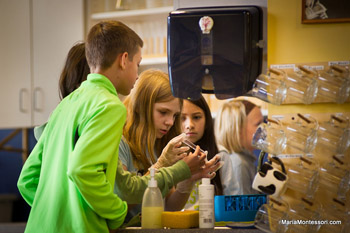
October 27, 2022
One hundred years ago, Dr. Montessori did not anticipate computers or the Internet, though she was certainly attuned to technological development and the impact it had on the culture. Post Oak and most other Montessori schools do not introduce computers into the classroom until the child is nine years old, not because Montessori was a technophobe (she most definitely was not!), but because the young child learns best through experience in the concrete, the tactile reality of the three-dimensional world rather than through two-dimensional simulation of electronic, virtual reality.
Consider the child’s experience of a cube. Does she learn more by seeing a flat, screen image of a cube (actually a two-dimensional hexagon), or by lifting a polished wooden block that measures 10 cm on each side and weighs 50 grams? After observing the way young children learn, Dr. Montessori told us, “Never give more to the mind than you give to the hand.”
Furthermore, contemporary brain research demonstrates the truth in Dr. Montessori’s dictum that a child constructs himself through his experiences in the environment. Dr. Bruce Perry, an internationally renowned neuroscientist and psychiatrist working in Houston, describes how this self-construction works: a child’s experiences change the biology of the brain, reinforcing and strengthening certain neurons through usage while pruning others through disuse. In her book Failure to Connect, Dr. Jane Healy discusses the impact of “screen time” on the developing brain and recommends that we delay computer use until children are 9 or 10 years old, a recommendation consistent with our practice here at Post Oak and at many other Montessori schools.
And so it is perfectly understandable to me, though at the same time ironic, that Montessori graduates have been instrumental in the development of landmark Internet resources that have helped to transform our culture.
In the past we have mentioned:
- Jeff Bezos, who founded Amazon.com, one of the first major companies to sell goods over the Internet, shaping the face of American commerce;
- Sergey Brin and Larry Page, who founded Google, the search engine that made the Internet more accessible and therefore more useful to a broader public;
- Jimmy Wales, created Wikipedia, the multilingual, Web-based encyclopedia that is written by reader-contributors and challenges many of the traditional assumptions about authorship, ownership, and information itself.

The November 6th issue of The New Yorker offers a profile of Will Wright, another former Montessori student and the developer of SimCity, which changed the concept of video games. SimCity is a computer simulation game of city-building. The game sparked a new paradigm in computer gaming by creating a game that could neither be won nor lost.
The New Yorker reports, “SimCity was slow to catch on, but seventeen years later the game has earned the company two hundred and thirty million dollars. A sizable number of players who first became interested in urban design as a result of the game have gone on to become architects and designers, making SimCity arguably the single most influential work of urban-design theory ever created.”
The article describes the impact of Montessori education on Will Wright:
“Wright flourished in the local Montessori school, with its emphasis on creativity, problem-solving, and self-motivation. ‘Montessori taught me the joy of discovery… It showed you can become interested in pretty complex theories, like Pythagorean theory, say, by playing with blocks. It’s all about learning on your terms, rather than a teacher explaining stuff to you. SimCity comes right out of Montessori—if you give people this model for building cities, they will abstract from it principles of urban design.’”
Wright then compares his experience in Montessori to traditional education: “The problem with our education system is we’ve taken this kind of narrow, reductionist, Aristotelian approach to what learning is…. It’s not designed for experimenting with complex systems and navigating your way through them in an intuitive way, which is what games teach. It’s not really designed for failure, which is also something games teach. I mean, I think that failure is a better teacher than success. Trial and error, reverse-engineering stuff in your mind—all the ways that kids interact with games—that’s the kind of thinking schools should be teaching. And I would argue that as the world becomes more complex, and as outcomes become less about success or failure, games are better at preparing you. The education system is going to realize this sooner or later.”
I am sometimes asked if, after a hundred years, Montessori education has kept up with the times. What I see is far more dynamic than simply “keeping up.” I see Montessori adults who are shaping our times, transforming the way we do business, the way we play, and the way we seek information. They are transforming the very media that are reshaping our culture—proof that Montessori prepares children for a lifetime of creative engagement.